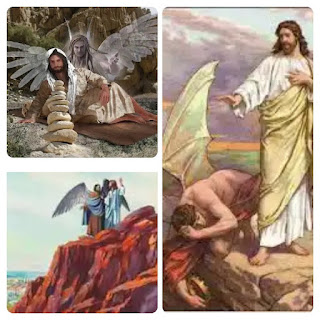HISTORY OF ASSUMPTION
*Tuesday, August 15, 2023*
*THE ASSUMPTION OF THE BLESSED VIRGIN MARY (Solemnity)*
First Reading. Revelation 11: 19:12:1-6, 10
Psalm 45: 10-12, 16 (R.10b).
Second Reading. I Corinthians 15: 20-27
Gospel. Luke 1: 39-56
TOPIC FOR REFLECTION
*THE HISTORY OF THE ASSUMPTION OF MARY*
If you were in the position of Jesus, will you allow your mother to taste the corruption of the earth?
The Blessed Virgin was preserved to give birth to the Son of God, who is also God. In this situation, the fact that she was preserved from the beginning to give birth to God, it will not be out of place if she is being taken to heaven body and soul.
God took her daughter's body and soul to heaven by Himself. Just as Jesus ascended into heaven, May too was Assumed into heaven.
Below are some historical facts taken from the Catholic News Agency (CNA) website.
The fascinating history of the Feast of Mary's Assumption
Catholics around the world mark the Feast of the Assumption of Mary, commemorating the end of her earthly life and assumption into Heaven.
But while the feast day is a relatively new one, the history of the mystery has its roots in the earliest centuries of Christian belief.
The Catholic Church teaches that when Mary ended her earthly life, God assumed her, body and soul, into heaven.
The dogma of the Assumption of Mary — also called the “Dormition of Mary” in the Eastern Churches — has its roots in the early centuries of the Church.
While a site outside of Jerusalem was recognized as the tomb of Mary, the earliest Christians maintained that “no one was there,” theologian and EWTN News Vice President and Editorial Director Dr Matthew Bunson explained.
According to St. John of Damascus, the Roman emperor Marcian requested the body of Mary, Mother of God at the Council of Chalcedon, in 451.
St. Juvenal, who was Bishop of Jerusalem told the emperor “that Mary died in the presence of all the Apostles, but that her tomb, when opened upon the request of St. Thomas, was found empty; wherefrom the Apostles concluded that the body was taken up to heaven,” the saint recorded.
By the 8th century, around the time of Pope Adrian, the Church began to change its terminology, renaming the feast day of the Memorial of Mary to the Assumption of Mary, Bunson noted.
The belief in the Assumption of Mary was a widely-held tradition and a frequent meditation in the writings of saints throughout the centuries. However, it was not defined officially until the past century.
In 1950, Pope Pius XII made an infallible, ex-cathedra statement in the Apostolic Constitution Munificentissimus Deus officially defining the dogma of the Assumption.
Pope Pius wrote:
“By the authority of our Lord Jesus Christ, of the Blessed Apostles Peter and Paul, and by our authority, we pronounce, declare, and define it to be a divinely revealed dogma: that the Immaculate Mother of God, the ever Virgin Mary, having completed the course of her earthly life, was assumed body and soul into heavenly glory,”
The decree was seen as the formalizing of long-held Christian teaching.
“We have throughout the history of the Church an almost universal attestation of this,” Bunson said of the Assumption.
“We have this thread that runs throughout the whole of the history of the Church in support of the dogma. That’s significant because it supports the tradition of the Church, but it also supports a coming to a deeper understanding of the teachings of the Church of how we rely upon the reflections of some of the greatest minds of our Church.”
What’s also notable about the dogma, he added, is that it “uses the passive tense,” emphasizing that Mary did not ascend into heaven on her power, as Christ did, but was raised into heaven by God’s grace.
Today, the Feast of the Assumption is marked as a major feast day and a public holiday in many countries. In most countries, it is a Holy Day of Obligation.
Bunson explained that on major feast days, it’s fitting to mark the significance of the feast as especially vital by emphasizing the necessity of celebrating the Eucharist that day.
(https://www.catholicnewsagency.com/news/36619/the-fascinating-history-of-the-feast-of-marys-assumption)
Peace ✌️ be with you.
Rev. Fr. Segun Oladeji, CRS.



Comments